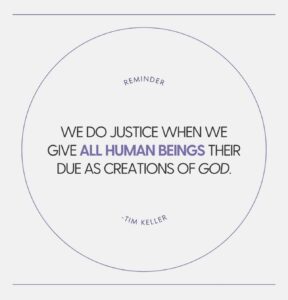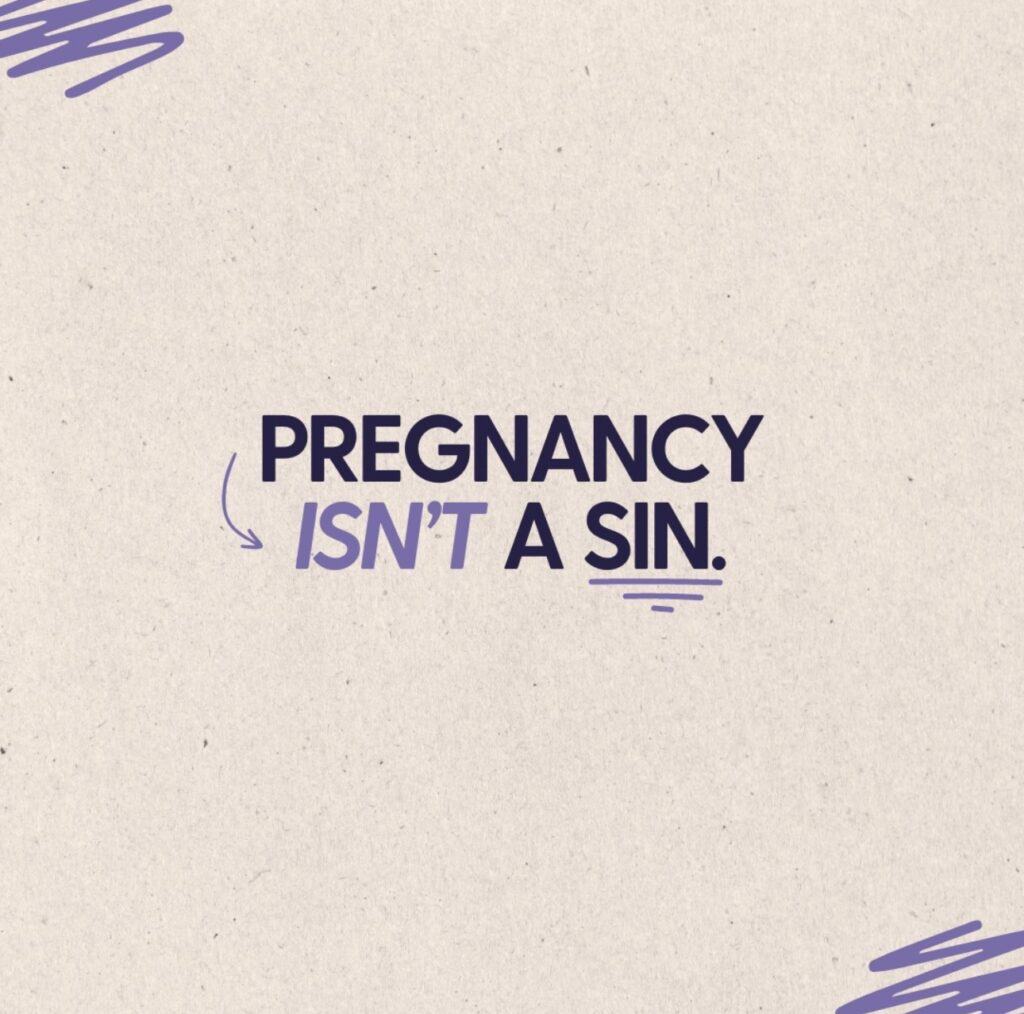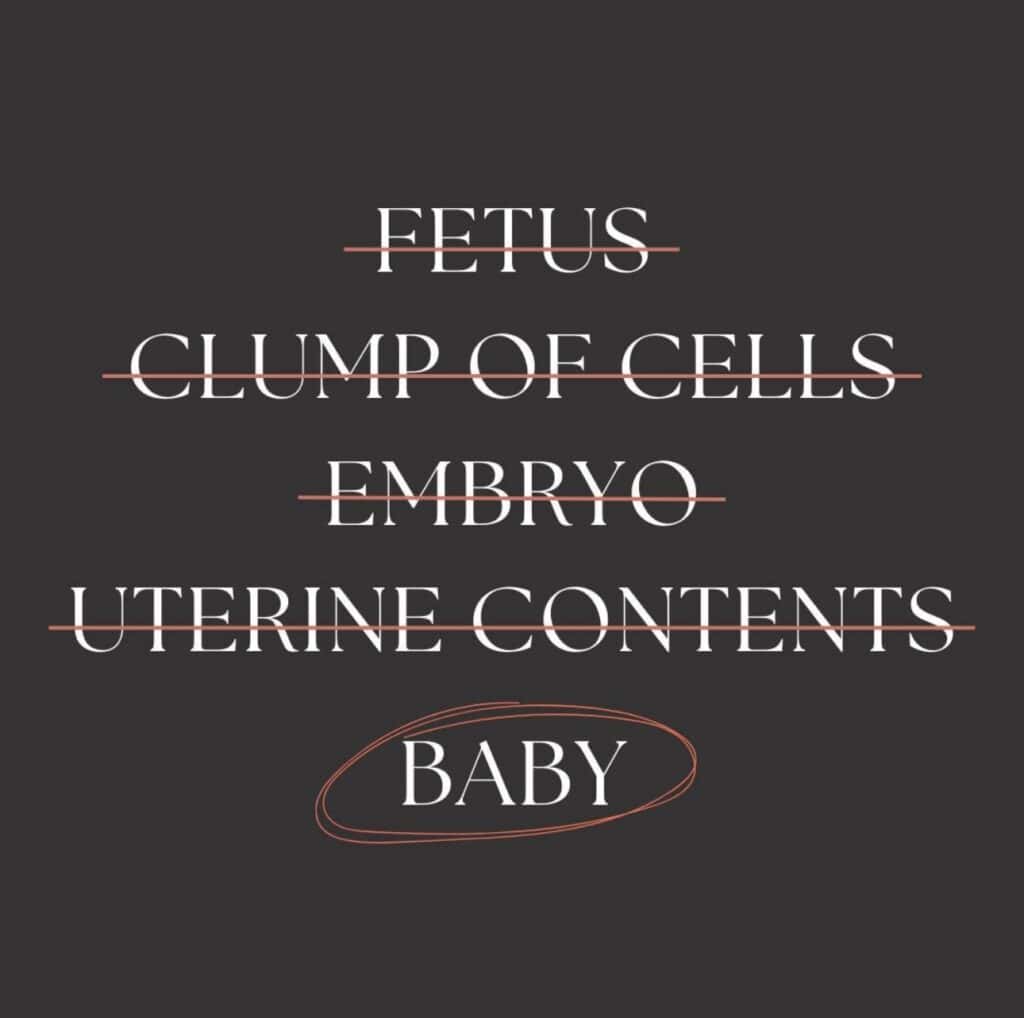In the controversial world of Pro-life advocacy, one of the hottest debates begins with four little words: Is abortion a sin? Every possible response feels condemning, calloused, uneducated, awkward, or unhelpful. If you say yes, you’re condemning the woman who felt abortion was her only option. If you say no, then you risk justifying every abortion, up to late-term or partial birth.
This question also opens a can of worms no one wants to watch wiggle: Is there a point in a pregnancy when abortion isn’t a sin? Is abortion a sin of the abortion provider or the mother? Won’t God forgive me if I get an abortion; so, why not go ahead with the procedure? It’s better to ask forgiveness than to seek permission, right?
What Is Sin?
In today’s world, the term, “sin” is used to identify some sort of action that God doesn’t like. However, according to scripture, sin is more complex and impactful than we’ve assumed. To fully understand sin, we must examine both God’s view of sin and His reasons for being anti-sin in the first place.
God and Sin
When first seeking to understand sin and how it impacts our lives, it’s important to remember God is not only a fair judge but a phenomenal father figure. Not only does he provide fair warning for us (those whom He loves), but He is also true to His word. He is honest with us about the choices we make. A good father, He is always careful to tell us of the ripple effects our decisions have in our lives and the lives of those around us.

His parenting style has a trademark of mercy, grace, and long-suffering which He extends to us even when we ignore His warnings. God’s mercy and grace in the presence of sin should not be confused with a lack of personal strength. Instead, it should serve as a reminder that God’s approach to sin is one of a desperate father, attempting to save his children from an aggressive and deadly disease. This disease is one which He first warned us to avoid back in the Garden of Eden—sin.
Sin in the Bible
Like most Christians, at an early age I became familiar with the classic Christian challenge, “Can God make a rock so big that he can’t pick it up?” And, like most Christians, I thought the question was unreasonable or unanswerable until I heard the one minister reply with, “He already did. He did so when he made man’s will.”
God created our will to be like His: weighty and powerful. Much like our Father in heaven, by our choices, we create and sustain and even usher in the future. Sadly, without proper knowledge of how to wield our will, we often find ourselves crushed by the weight of our bad decisions.
In Romans 6:23, Paul explains that “the wages of sin is death.” According to Paul, sin is not so much a label God puts on bad behavior but an action we perform to earn a certain consequence. That consequence, as outlined by God in early Genesis, is death.
How is Abortion a Sin?

Think of how touching a hot stove can result in a nasty burn. Is it your parent’s fault you were burned, because they warned you not to touch the stove? Of course not! Being burned after touching a hot stove is much like our relationship with sin. God warns us not to touch it. Sadly, like stubborn children, we often do it anyway.
Our first example of this is found in Genesis 3. In summary, God says, “Hey, see this tree? Don’t eat its fruit or you’ll die.” to which the crafty serpent whispers, “He’s lying. He just doesn’t want you to be as powerful as Him.”
Sadly, Adam and Eve chose to believe the serpent over God. This resulted in the release of a catastrophic disease, sin, which poisons both the body and the soul. Sin acts much like the diseases of today. Over time, if left untreated, it grows, spreads, and eventually kills those it infects.
The Cure for Sin
After the whole Garden of Eden debacle, God was gracious enough to offer guidelines for how mankind should live in a fallen world. Undoubtedly, He did this so that we, His wayward family, could have a fighting chance against the horrors we unleashed by attempting to out-god God.
These guidelines, once complex and rigorous, were simplified through Jesus who demonstrated the heart of God for mankind throughout his ministry (observable in Matthew, Mark, Luke, and John). These guidelines, in the form of spiritual practices and commandments, serve as a user manual for using our most powerful weapon—our God-inherited free will—without harming ourselves or others. It also outlines how to restore our relationship with our Heavenly Father.
These same guidelines were eventually summarized by the creation of the biblical canon (the Bible). Now that we know God has provided the Bible as a point of reference for how we should live our lives as believers, let’s explore what the Bible has to show us about our big question, “Is abortion a sin?”
Is Abortion a Sin?
In the years I’ve been steeped in whole-life advocacy, I’ve found there are two huge misconceptions the general public has about abortion. The first is that abortion is a simple black or white, “Save the babies!” issue. The second is that abortion is a problem too complex to be sorted by God, or too specific to be found in the Bible.
In contrast, God’s heart for mankind and his struggles with sin are demonstrated throughout scripture. Observing His commandments to His followers and His responses to their actions, we can derive His thoughts and opinions on today’s challenges. In addition, through the accounts of His son, Jesus, we learn how to respond when these challenges appear in our lives.
Is Abortion Murder?
The abortion issue is complex, involving more than one person, and usually for more than one reason. Knowing this, if we want to understand God’s thoughts towards abortion, we need to approach the issue from several different angles.
To begin, we know the Bible hosts many scriptures stating and restating God’s view on taking a life. Two great examples of this are:
To further this point, God’s commandment, “You shall not murder.” is restated many times by Christians of the New Testament.
God’s view on murder is clear: don’t do it. However, there are also many scriptures where death is permissible in certain circumstances. Take, for example, the following two passages. These scripts outline death as punishment and in cases of self-defense.
Now that we’re aware of God’s stance on killing, as well as the grace provided for cases in which death is unavoidable—what about abortion? Where does abortion fall on the scale of just and unjust death? And are there times when abortion is justified?
Does God Say Abortion is Sin?
While there is no particular scripture saying, “Thou shall not have abortion.” there is an abundance of scripture to help us find whether or not God sees abortion as a sin. Below are three powerful instances from which we can derive an answer to God’s views on abortion. These three instances include God’s responses to trading lives for quality of life, shedding innocent blood, and oppressing the weak.
Trading Lives for Quality of Life
While no seasoned pro-life advocate would compare an abortion-vulnerable woman to a pagan practitioner from Bible times, we cannot deny that there are similar elements between today’s abortion decisions and pagan sacrifices of the Old Testament. In short, the practice involved serving a popular pagan god known as Molech. In exchange for material blessings and a better quality of life, followers of Molech would offer children (usually infants) as a burnt sacrifice. Sometimes, these sacrifices were made out of desperation, a plea for help and provision during times of famine or great need.
Naturally, God showed no tolerance for this practice.
“You shall not give any of your children to offer them to Molech, and so profane the name of your God: I am the Lord.” (Leviticus 18:21)
God was not a fan of the idea that, when it comes to taking lives, the end justified the means. Trading a child’s life in exchange for personal needs was an act He considered “profane”.
Now, you might read about God’s disdain for human sacrifice and find it odd that He accepted His son as a blood sacrifice on behalf of mankind. Thankfully, the Bible sheds light on this point as well.
Jesus, the Last Blood Sacrifice

In God’s eyes, only one perfect sacrifice needed to be made to ransom mankind. This sacrifice would reclaim man’s body and soul from spiritual and physical famine and poverty. He provided this sacrifice of himself through His only son, Jesus. Not only was Jesus the only person qualified to make such a sacrifice (being the son of God and without sin), but he also consented to the act.
He chose to be our sacrifice. We know this from the scriptures, too.
Speaking of giving his own life, Jesus said:
“No one takes it from me, but I lay it down of my own accord. I have authority to lay it down, and I have authority to take it up again. This charge I have received from my Father.” (John 10:18)
Knowing the lineage of Jesus, his fluency in both physical and spiritual law, and His relationship with his Father, it’s clear that Christ’s sacrifice and those of Molech are incomparable. One is a demonstration of love, laying down one’s own life for the sake of another. The other is extorting the innocent out of desperation or self-preservation.
The Crime of Shedding Innocent Blood
People tend to think that God is disconnected from our sins, sitting on His opulent throne, checking His naughty list like Santa Claus. However, according to scripture, He experiences our sins, and the injustices we commit, in ways we could never understand. This is a fact we first find in early Genesis.
“Cain spoke to Abel his brother. And when they were in the field, Cain rose up against his brother Abel and killed him. Then the Lord said to Cain, ‘Where is Abel, your brother?’ He said, ‘I do not know; am I my brother’s keeper?’ And the Lord said, ‘What have you done? The voice of your brother’s blood is crying to me from the ground.’” (Genesis 4:8-10)
It’s a chilling thought; God could hear Abel’s blood crying to Him from the ground.
To God, injustice has a distinct and wretched sound, one He cannot ignore. We find more evidence of God’s hate for the shedding of innocent blood in passages like Proverbs 6.
“There are six things that the Lord hates, seven that are an abomination to Him: haughty eyes, a lying tongue, and hands that shed innocent blood, a heart that devises wicked plans, feet that make haste to run to evil, a false witness who breathes out lies, and one who sows discord among brothers.” (Proverbs 6:16-19)
As horrible and haunting as it may seem, we would be grossly naive to assume that God cannot hear the shedding of innocent blood that takes place in every abortion facility. Even if we claim, like Cain, that we shouldn’t be held responsible for the act, the cries of innocent blood testify otherwise.
Oppressing the Weak
There is an abundance of scripture to reveal God’s thoughts on oppressing the weak. Below are a few scriptures that reveal, not only God’s just nature but His love for all humankind, no matter the value assigned to them by others.
For context, these scriptures center around the acts of Jesus. In John 5:19-20, Jesus claims his actions and responses were learned from directly observing the actions of God, his father.
Jesus, the Ultimate Human Right’s Advocate
As the ultimate advocate, Jesus exemplifies the Father’s heart for inclusion and equality:
- John 8:11 and Luke 7:36-50. Jesus responds to women (an adulterer and a sex worker) with warmth and grace.
- John 4:7-15, Luke 5:29-39, Luke 17:11-19, Luke 19:1-10. Jesus befriends the deplorables of his culture. These people included tax collectors, lepers, and those from ethnicities with whom Jews (like Jesus) weren’t supposed to associate.
- Matthew 25:34-40. Jesus equates serving God with serving foreigners, the poor, the sick, and the imprisoned.
- Mark 10:13. Jesus outlines his love for children, saying the Kingdom of God belongs to them.
- Luke 14:12-24. Jesus teaches gratitude, grace, love, and inclusion, telling his followers to, “invite the poor, the crippled, the lame, the blind,” into their lives.
- Matthew 18:5-6. Jesus says it’s better to be weighed down and thrown in the sea than to hurt a child (or those with childlike faith).
Is Abortion a Sin in God’s Eyes?
From the life of Jesus, we see the heart of the Father brimming with love for those that society counts as disposable. These people include “sinners”, condemned by the religious leaders of that time. This fact is a vital component of understanding God’s opinion of the abortion issue. His concerns extend to everyone involved: the woman with her reasons for abortion, the child in danger of being aborted, the abortionist carrying out the procedure, and those he has called to minister to each of them with Christ-like love.

The act of abortion trades the life of one human for the betterment of another. It takes an innocent life and condemns the hands that shed their innocent blood. Moreover, it’s become a nasty tool for oppressing a group of people with little or no voice or value in current culture. While not every abortion case involves a child who is “unwanted,” it’s a procedure first made popular in the US to weed our people labeled as unfit for society. These “unfit” people included those with disabilities, children of criminals and delinquents, and children born into poverty or oppressed minorities. This fact was even made clear by Planned Parenthood’s founder, Margaret Sanger, who was first drawn to abortion via her support of eugenics.
The Problem with Asking For Forgiveness Later
Does every woman feel sadness or regret after their abortion? No. But we’d be naive to assume that a procedure meant to end a human life and halt a naturally occurring process within a woman’s body didn’t impact her far beyond what the abortion providers disclose. Of course, God will forgive—that’s Christianity 101!
But God doesn’t identify sin for His sake. He warns us of it for our sake.
God forgives because forgiveness was purchased for us through Jesus. Still, if we sin, our bodies and souls bear the consequences.
If you touched a hot stove as a child, did your parents still love you? Yes. Did they forgive you for disobeying? Yes, but that doesn’t mean you walked away unscarred. We can be forgiven of all sin yet terribly broken. Sadly, according to many post-abortive women, the path to wholeness can be a lifelong journey—one that’s painful, confusing, and lonely at times.
The Impact of Sin
No matter our theology, we can’t escape the impact of partaking in sin. This was best explained by C.S. Lewis when he said, “Every time you make a choice, you are turning the central part of you, the part of you that chooses, into something a little different than it was before.”
Lewis further explains that it’s these choices, compounded over time, that make us into “a creature that is in harmony with God, and with other creatures, and with itself, or else into one that is in a state of war and hatred with God, and with its fellow creatures, and with itself.”
In the time of Molech, the price of one child was supposed to free a person from misfortune and poverty. But did it really, or did it just make those who sacrificed into something different? Perhaps it simply made them numb to the pain of another’s suffering while mentally relieved from the fear of poverty.
There’s plenty of research suggesting that, much like the sacrifices of Molech, abortion does little to treat the primary reasons for abortion.
So, Is Abortion A Sin?
Now, knowing all that we do about sin and abortion, is abortion a sin?
Abortion oppresses the weak, trades a child’s life for monetary gain, sheds innocent blood, and produces ripple effects that impact families, communities, and those involved for years to follow. It makes victims of children, neglects women who deserve better and actual health care, and turns medical practitioners into monsters.
So, is abortion a sin? How can it not be?
Still, God’s identifying sin and how we have sinned was never about condemning us but saving us. Consider the evidence:
“For God so loved the world, that He gave His only Son, that whoever believes in Him should not perish but have eternal life. For God did not send His Son into the world to condemn the world, but in order that the world might be saved through him.” (John 3:16-17)
Thankfully, the one who has called your sin a sin isn’t waiting around to punish you for your disobedience. In contrast, He is hopeful that He can save you. His heart is to restore you, to bear with you the “wages” of your sin: every form of death that sin brings.
Related Articles:




















